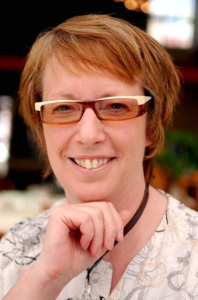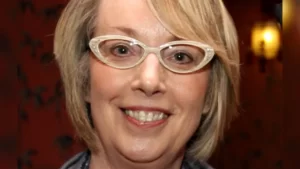The following opinion piece was published in the Brighton & Hove News on 19 January 2024 under the title “Sue Addis – Remember and Speak her Name”
On 14th December, as Chair of the Mary Clarke Statue Appeal, I attended a

Sue Addis
meeting of Brighton & Hove Council, to see Mary Clarke posthumously awarded the Freedom of the City. Jackie O’Quinn, the Mayor, hosted a reception and then presented the certificate to Briony Goulden, who is a great great niece of Mary Clarke and an Appeal Trustee. She was accompanied by her two daughters, Sylvie and Lena, three times great nieces of Mary, both Child Ambassadors of the Appeal.
It was a wonderful day on which, as someone said, peace seemed to break out amongst the politicians and those who made speeches spoke from the heart. The leader of the Council, Bella Sankey, moved the notice of motion in a passionate address. Councillor Mitchie Alexander read a powerful and very moving poem she had written.
Our bronze maquette (model), made by sculptor Denise Dutton to the design of the eventual statue, was on display on the Mayor’s desk, alongside a seven foot ‘cut-out’ to the same design, giving councillors an idea of what the full sized statue would look like. A hand embroidered banner depicting Mary Clarke made by well-known peace activist Jenny Engledow, was also on display.
It was a happy event and wonderful to see this previously forgotten woman honoured. Yet I could not help feelings of great sadness, not just at the loss, over centuries, of so many women’s histories, but because so many female lives, like Mary’s, have been snuffed out by violence.
It is a cruel injustice that so many of women’s achievements remain obscured – though an increasing number of historians and local organisations now exist to try to put that right. However, it is an even greater injustice and an ongoing tragedy that, even today, the lives of women recently lost to violence are barely commemorated, certainly not celebrated. Instead they are shrouded in shameful oblivion, as if they and not their killers are dishonoured by their deaths.
Many men have been awarded Freedom of the City, but Mary Clarke is currently the only woman who holds that honour. Unsurprisingly, some at the council meeting expressed the hope that more women would be recognised. I heard someone mention M.P. Caroline Lucas as a possible choice. Another suggested Professor Kathleen Stock. Both would be very worthy recipients, but that evening I had another woman’s name foremost in my mind, one who, like Mary, died by violence.
Two days before the special Council meeting I had joined members of the Women’s History Group for their Christmas dinner. It was a significant and a poignant choice, first because it took place on the 12th December, the anniversary of Mary Clarke’s birth in 1861 and secondly because we met at Donatello’s restaurant in Brighton Place. Donatello’s was central to the phenomenally successful restaurant business of businesswoman and philanthropist Sue Addis, until her untimely and tragic death three years ago.
Over the years, there have been many women deserving of the Freedom of the City, but none more so than Sue Addis who could and should have received it years ago, while she still lived. Sue was a woman of extraordinary charm and ability, an inspired businesswoman and one who put her wealth at the service of her community. She was a generous donor to charity and a good friend to many.
I knew Sue only a little, really only to smile at, though I regularly saw her at Donatello’s front of house, supporting staff, making customers feel welcome and of course building her business. She was a superb communicator and I was in awe at her capacity to network. Sue knew everybody, from local homeless people to the most powerful in the land, who during political conferences made regular visits to enjoy Donatello’s cheerful ambience and simple, tasty Italian food.
When she lived, Sue was probably the most influential woman in the city, which makes it all the more tragic that since her death, people barely speak of her. Powerful as she was, Sue died like so many women, a victim of domestic violence, brutally stabbed by her grandson in the most painful and undignified of circumstances.

Sue Addis
The British are notorious for their inability to talk about death or the dead – even to use the words. However, this conspiracy of silence is worsened when the victim dies by violence, or by their own hand, and is worst of all when the victim is a woman, especially one killed by a member of her own family. When this is the case, however talented the woman, however great her contribution to her community, more will be written about the perpetrator than about the victim. And when the publicity about the crime dies down, there is silence. Just silence.
People drop their voices when Sue Addis is mentioned, but mostly she is not mentioned at all. This vibrant woman who lived so well has been cut down twice – once by her grandson and then by us, her community. It is thus that women are forgotten.
Sue’s grieving family have quietly set up a Memorial Fund in her name and this is to be welcomed, but it is not enough. Sue’s community needs to do more, much more. The Council might name a park or city-central building or Square after her – or rename Brighton Place, the street Donatello’s has dominated for so long, as Sue Addis Street. It should not be possible to so easily snuff out a woman’s legacy.
As a start, the Council could award Sue the Freedom of the City she served for so long. But before that, it needs to do something more fundamental, which is to simply talk about her, not just about her terrible death, though that must be remembered, but more importantly about Sue herself, her smile and her laughter, and the courageous and generous way she lived her life.
The campaign for a statue for Mary Clarke has never just been about commemorating one exceptionally brave, historically important woman whose story was lost. It also sets a path towards reclaiming the histories of other women subject to violence, honouring their lives and wrenching their names out of shame and silence.
Mary Clarke was forgotten for too long. We need to make certain this does not happen to Sue Addis.
We need to speak her name.
